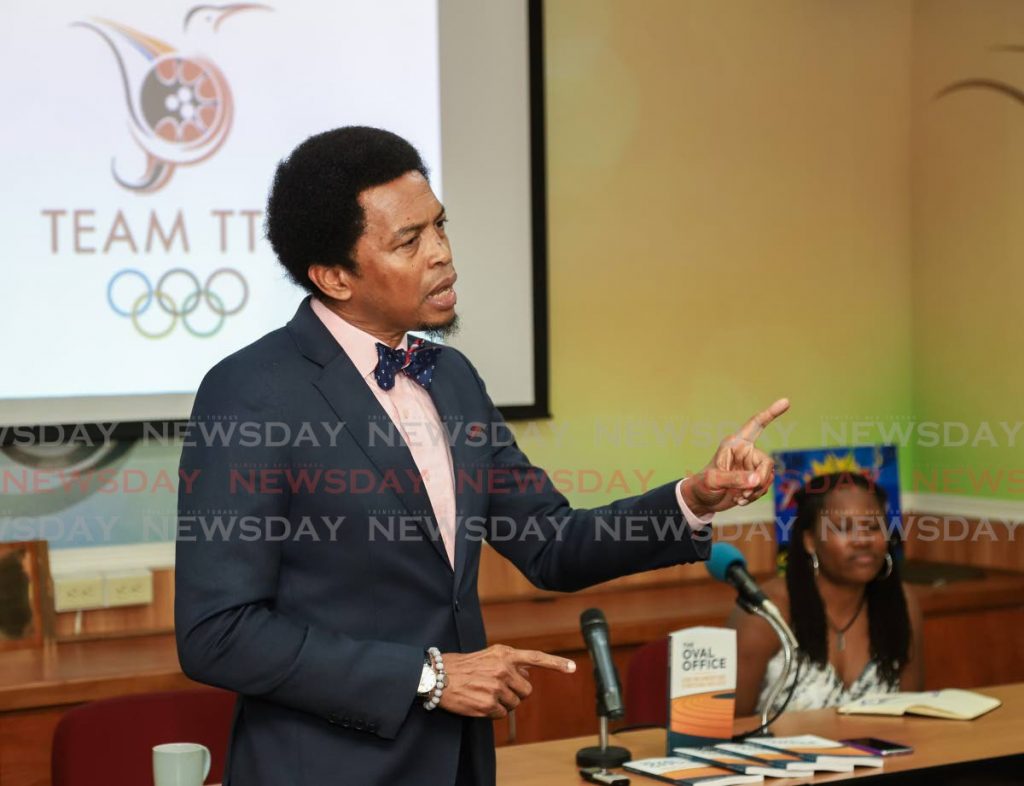THE Caribbean Regional Anti-Doping Organisation (RADO) is gearing up to resume athlete testing under new regulations.
RADO, in accordance with the World Health Organisation (WHO) and the Pan American Health Organisation (PAHO), has amended the rules to facilitate testing during the covid19 pandemic.
At Saturday’s TT Olympic Committee-hosted webinar entitled Doping Control during the Pandemic, RADO executive director Dr Sasha Sutherland unveiled a list of changes and protocols implemented to ensure proper testing is still conducted. Several major international competitions have been on hold owing to the pandemic but are slowly resuming with strict protocols to ensure safety.
Sutherland said, “The reason why we’ve made these adaptations is to ensure we follow WHO, PAHO or local Ministry of Health protocols but still maintain the integrity of the sample collection process to ensure that all our procedures remain in compliance with the international standard for testing and investigations.”
The five factors RADO have considered for the resumption of testing are: the status of covid19 in the country and the number of persons affected; whether sport or competition has resumed in the country; the ease of movement (shipping) of samples to the testing labs, the availability of personal protective equipment (PPE) and communication strategies to engage athletes with informing and reminding them of the new procedures and the repercussions of refusing testing during this time.
According to Sutherland, a guidance document has been issued for the resumption of testing based on WADA’s guidelines and RADO has been conducting seminars with its doping control officers in 17 of its 18-member countries.
“We want to make sure that if testing is to resume, whether under the authority of the RADO or an international federation or third party testing agency, our doping control officers know what's to be done. Most of the measures that we’ve added to the sample collection and supporting documentation really applies to the use of PPE,” she added.
RADO is responsible for training anti-doping control officers and in this new environment they have done such, informing them of the new normal, how things operate to ensure safety and emphasising safety of the athletes and the officers.
Once testing is done, RADO engages the laboratories to ensure they can accept the samples, test them and return them within a 10-day window. Upon completion, RADO plans to expand the programme.
Sutherland used TT’s current hosting of the Caribbean Premier League (CPL) as an example.
“We had to make a lot of adjustments and we worked with the International Cricket Council with the doctors on the ground responsible for the CPL and our doping control officers in TT. It has been a lot of back and forth, a lot of collaborating, a lot of negotiating what’s going to happen. Drug testing is going on at the CPL."
She also reiterated that although athletes are not as active as before, owing to the pandemic, doping control still exists and athletes and coaches alike have a responsibility to ensure they remain within the regulations.
Using covid19 as an excuse to delay or refuse testing also carries individual penalties. Educating athletes and managerial staff on these minor amendments remains integral in ensuring all parties involved have total understanding of these changes going forward.
Sutherland continued, “You can’t say: ‘No, I have covid19 and will not do it (test).’ You can, but be guaranteed that an investigation will take place and if there isn’t justification for refusing the test, an athlete may be served with a notice of charge for refusal of testing. Covid19 exists and we’re taking all the precautions but once a mission order is issued, any athlete can be tested. We want to make sure athletes know this.”
The RADO executive member stressed that more emphasis must be placed on becoming better educated on these amendments and its requirements.
TTOC president Brian Lewis hinted there would be several changes to the World Anti-Doping Agency code for 2021. With more and more countries worldwide reducing penalties for possession of non-performance enhancing substances such as marijuana, the code has opted to reduce its ban on recreational drug use.
Lewis said, “There is a recreational drug use issue in Caribbean, especially regarding marijuana. And that the changes to code included reduced ban for recreational drug used out of competition. It’s important for all sport stakeholders to be educated. The new code is 180 pages with 27 articles and six revised standards. The first line of defence against anti-doping violations is knowledge and making informed choices.”
Additionally, TTOC vice-president and chairman of the anti-doping committee, Dr Terry Ali said once the Youth Commonwealth Games have been given the all-clear to be hosted in TT in 2021, both out-of and in-competition testing will be done.
He said, “If the Games are in progress it means the local health authorities have approved that the Games can continue and once they can, there will be normal drug testing procedures.”
Saturday’s webinar was the first of a seven-part series on anti-doping. Other topics in the pipeline to be discussed are therapeutic exemption use, resource management and athletes’s rights.
Also contributing at the webinar were WADA Latin America office director Maria Jose Pesce and TTOC project officer Rheeza Grant.

